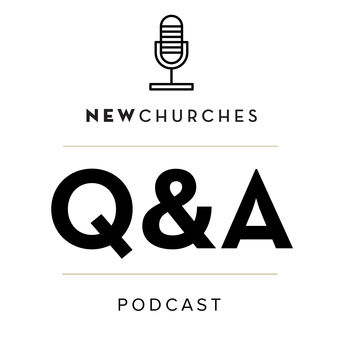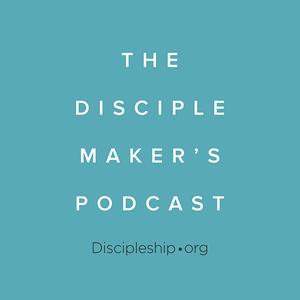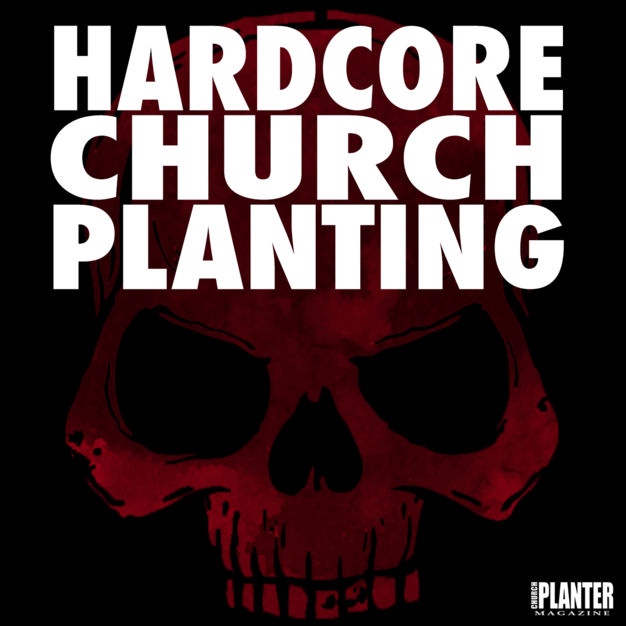
Exponential Podcast
Exponential
Exponential is a growing community of leaders committed to accelerating the multiplication of healthy, reproducing faith communities. We equip movement makers with actionable principles, ideas and solutions. We are passionate about accelerating multiplication through movement makers! Jesus. Leaders. Acceleration. Movements. Multiplication. The Exponential Podcast includes over 1000 hours of audio training to equip church leaders seeking to become more multiplying.
- 52 minutes 38 secondsPlanting Churches with Disciple Making DNA
Is your church plant built for disciple making?
—
The North American model of church is not based upon disciple making, but that can be changed in a new church plant. Join Bobby and Paul as they describe how to plant new churches with disciple making DNA.
—
Welcome to One Eighty, welcome to Disciple-Making. Over the next 8 weeks, we will be turning our focus to creating a discipleship culture as we look ahead to our 2024 Global Exponential Conference March 4-7th.This podcast is one of several workshops from Exponential’s Global 2023 Conference in Orlando. You can grab the Evangelism Resource Kit for this workshop and more to train you and your team: https://multiplication.org/product/evangelism-2023-orlando-workshops-resource-kit/
To learn more about Exponential events, visit: https://exponential.org/events
For all other links: https://shor.by/Exponential
5 December 2023, 2:39 am - 39 minutes 30 secondsDoes Your Discipleship Include Good Theology?
Discipleship MUST always be guided by good theology.
—
On this episode join Bobby and Carl as they explore why it’s more important now than ever to have good theology. They will talk about practical tools the local church needs in this cultural moment.—
Welcome to One Eighty, welcome to Disciple-Making. Over the next 8 weeks, we will be turning our focus to creating a discipleship culture as we look ahead to our 2024 Global Exponential Conference March 4-7th.
This podcast is one of several workshops from Exponential’s Global 2023 Conference in Orlando. You can grab the Evangelism Resource Kit for this workshop and more to train you and your team: https://multiplication.org/product/evangelism-2023-orlando-workshops-resource-kit/
To learn more about Exponential events, visit: https://exponential.org/events
For all other links: https://shor.by/Exponential
20 November 2023, 9:00 pm - 36 minutes 38 secondsWhat’s the Difference Between Discipleship and Evangelism?
Welcome to One Eighty, welcome to Discipleship. Over the next 8 weeks, we will be turning our focus to creating a discipleship culture as we look ahead to our 2024 Global Exponential Conference March 4-7th.
—
On this episode we are talking about how Jesus’ style of evangelism always led folks to follow Him. So many times we try to separate evangelism and discipleship. That leaves us with weak Christians and an even weaker church. Walk with us through the exploration of the Master’s plan for evangelism that leads to discipleship.
Speaker: Dan Leitz
—
This podcast is one of several workshops from Exponential’s Global 2023 Conference in Orlando. You can grab the Evangelism Resource Kit for this workshop and more to train you and your team: https://multiplication.org/product/evangelism-2023-orlando-workshops-resource-kit/
To learn more about Exponential events, visit: https://exponential.org/events
For all other links: https://shor.by/Exponential
8 November 2023, 11:43 am - 1 hour 2 minutesFive Practical Prayers to Equip Your Members for Their Personal Mission Field
Are your members equipped for the personal mission? Many of us tried turning our churches into evangelistic “fishing ponds.” That didn’t work. We taught our members to invite others to church instead of equipping them to go and make disciples. So, let’s turn our equip our members as “spiritual archaeologists” uncovering treasure in the people around them. The goal is to embolden ordinary Christ-followers to enter and explore friendships among the 70 percent of Americans no longer interested in Christianity. If you are looking for a simple, practical and profound way to grow your church on mission, this is the episode for you.
Evangelism Series // Week 5
Speakers: Ralph Moore
—
This podcast is one of several workshops from Exponential’s Global 2023 Conference in Orlando. You can grab the Evangelism Resource Kit for this workshop and more to train you and your team: https://multiplication.org/product/evangelism-2023-orlando-workshops-resource-kit/To learn more about Exponential events, visit: https://exponential.org/events
For all other links: https://shor.by/Exponential
30 October 2023, 8:17 pm - 54 minutes 4 secondsThe Lost Cause Movement
Dive into a live Q&A session with Faith Eury Cho, Albert Tate and Aaron & Hannah Barnett as they unpack some keys to an evangelism culture and why evangelism is not a Lost Cause.
Evangelism Series // Week 4
Speakers: Faith Eury Cho, Albert Tate, Aaron & Hannah Barnett
—
This podcast is one of several workshops from Exponential’s Global 2023 Conference in Orlando. You can grab the Evangelism Resource Kit for this workshop and more to train you and your team: https://multiplication.org/product/evangelism-2023-orlando-workshops-resource-kit/To learn more about Exponential events, visit: https://exponential.org/events
For all other links: https://shor.by/Exponential
24 October 2023, 12:51 am - The Delight of Small Ministry in Small Places
A few years ago, a ministry friend and partner of mine was attending the Exponential conference in Orlando when he overheard a conversation between two prospective church planters that went something like this:
Planter 1: “How big is the city where you’re planting?”
Planter 2: “About 15,000”
Planter 1: “Hmmm, I wouldn’t plant in a city any smaller than 22,000.”
My friend had to laugh to himself. At the time, he had been a senior pastor in a town with a whopping population of 25 for 15+ years. The church has since sent a significant percentage of its congregation to plant in other rural towns in Kansas.
Imagine the faith required to send hundreds of your members to go and start new works elsewhere when you minister in what some might consider a wilderness! That call sounds like a death sentence for ministry.
A death sentence is an apt description of how many Americans perceive rural ministry. Rural towns are where pastors who couldn’t cut it in the “big time” go to die. Rural ministry is “junior varsity” for those either training for the big leagues or those who will never measure up to move on to “bigger and better” places.
If you need more convincing, look at those we typically platform and clamor to learn from so we can implement the methods that made them “successful.” You won’t find a small-town pastor who has faithfully and effectively served their community for decades often because their ministry isn’t large enough to be of any notable consequence. Have you ever wondered what we are missing when we overlook the small ministries and places of the earth?
Jesus loved small ministries and places.
Jesus loved small ministries and places. He was born into tiny, insignificant circumstances: “But you, Bethlehem Ephrathah, though you are small among the clans of Judah, out of you will come for me one who will be ruler over Israel, whose origins are from of old, from ancient times” (Micah 5:2, NIV).
He grew up in Nazareth (population in the hundreds), a village whose reputation is expressed by the following question: “Nazareth! Can anything good come from there?” (John 1:46).
Both Jesus and John the Baptist began their ministries in the more sparsely populated regions of Israel. Jesus was unimpressed by crowds and consistently resisted the pull to build a large brand, network, or movement. He did the opposite of what we would advise him to do today, and I have a feeling we wouldn’t be calling him to be the headliner at our conferences. Again, what are we missing when we overlook the small people and places of the earth? Could we be missing the heart of Christ himself?
My husband and I have been ministering in rural Kansas for 20 years. Because I am a talented speaker, singer, and musician, some have asked me why I don’t seek a position at a megachurch or move where my gifts could be put to “better use,” somewhere I could be more visible and have better opportunities.
In response, I point to the day God called me to serve rural communities. I was the new worship pastor for the church in the town of 25 I mentioned previously, and I was reading Return to Worship by Ron Owens. In his chapter titled “To Get or to Give?”, he tells the story of a young lady with a gorgeous singing voice who had been serving her small-town church faithfully, but had recently left to join the choir of a megachurch having been persuaded that she would get more out of a “bigger and better” church that could amplify her talent. He likened her story to David’s theft of Bathsheba in 1 Samuel 12.1
As I read that story, the Holy Spirit said, “You will not be a ewe lamb.”
That day, I committed to serving alongside Jesus in the small, seemingly insignificant places he leads me. My life and ministry are deeply blessed and enriched as a result.
Christ is powerfully present in small places.
So, back to the question: What are we missing when we overlook the small ministries and places of the earth? First, Christ is powerfully present in small places. Of course, he is present everywhere and values all people, but there is a potency in his gaze toward the poor, the powerless, and the disregarded. Throughout Scripture, God intentionally gravitates toward the underprivileged. He chooses the younger sibling over the eldest – not because one is better, but to radically work against the human tendency to elevate some people at the expense of others. He chooses Israel – not because they are the most powerful or populous nation, but because of their insignificance to the world’s great empires that his glory might be made manifest amongst humanity’s weakest. God is with those unimportant to the world because they are profoundly important to him. If we want to be in all the places where Jesus is, there must be no flyover country, nowhere too small or insignificant to be worth our time, nowhere that is beneath our notice.
Not only is Christ present among the small and despised, but his heart and character are revealed through them. If you want to learn to be like Jesus and draw close to him, follow his ministry pattern. Jesus intentionally turned away from the powerful and prosperous and set his gaze and favor on the foolish, the weak, the overlooked, and the outcast, or, as the gospel authors put it, the tax collectors and sinners, those who recognized their need for a savior.
In doing so, those with power and prestige were drawn to him, their curiosity piqued by this strange new teacher who taught with authority and dared to overlook them. I don’t think they would have paid much attention to Jesus had he come to them first, and he loved them enough to dismantle the lie of their own self-importance. He knew that proximity to the least of these produces the best leaders: Servants who are humble, gentle, and lowly, disciples who never graduate from their need to learn, not just from Jesus but from those to whom they are sent.
While rural ministry is prone to pitfalls like any other ministry, there is a unique opportunity in these places to die to self and learn humility. What could be more against the grain of American culture than seeking the small and ordinary and resisting being swept into the current of capitalistic consumerism that often produces churches that look and act more like corporations than the kingdom of God? Most rural people do not care and are unimpressed by titles, education, wealth, and positions of authority. They love and are proud of their community and want to see it thrive. They value togetherness and developing deep, rooted relationships committed to the long haul, and they aren’t necessarily interested in seeking what is bigger and better.
If you want to learn how to pursue what Friedrich Nietzsche called “a long obedience in the same direction,” rural communities are great places to do so.
Rural people often love and care for one another well and know how to appreciate the simple stuff of life. If you want to learn how to pursue what Friedrich Nietzsche called “a long obedience in the same direction,” rural communities are great places to do so.
For the past couple of years, I’ve had opportunities to enter collaborative spaces with people whose ministries are far grander than mine. While I have appreciated and learned a lot from them, this competitive sense of jockeying for importance still exists. The cultural waters we swim in make it nearly impossible to avoid. Who will offer the most profound word? Who has the best visionary ideas to offer? Who has the best connections? Honestly, it’s exhausting to me, and I often feel like an imposter, a fish out of water. My tiny area of the world is dwarfed in comparison.
Amid these experiences, God has opened a way for me to participate in a ministry to the ladies at the local jail in our small town. I told my husband recently, “Out of all the numerous opportunities I’ve had recently, my time spent with the women at the jail is my favorite. I could meet with them for the rest of my life and be content.” There is something so beautifully refreshing about communing with people who have nothing to hide, people for whom masks and pretending are useless. I laugh when I think about how little I do, how unnecessary I am, and how God’s purpose for me is more about what he wants these women to teach me than what I have to teach them. All I do is share the story of Jesus, and the Holy Spirit moves.
I have the incredible privilege of coming along for the ride and witnessing Jesus at work in the hearts of these least of these daughters who are so dear to their Father’s heart. If you want to be where Jesus is, if you want to learn to be more like him, find the least, the last, and the lost in your city, be it big or small, and resist the tendency to overlook and “despise the day of small things” (Zechariah 4:10).
There are a couple of quotes by Roland Walls from my Celtic Daily Prayer Book that keep me grounded when I am discouraged by my own smallness and tempted to seek the type of success and notoriety the world deems valuable. I hope they encourage you like they have me.
Preoccupation with numbers and busyness is always a symptom of disease. ‘Success’ in the Christian enterprise has to pass through this lonely man, Jesus, who failed completely. So, somehow or other, theologically, and therefore spiritually, the success addict’s disease is that he’s left the centre, because the centre isn’t very encouraging. And therefore it has something to do with what does he think about Christ, and whose son is He, and how far did He get? You can always keep the success story going with the resurrection – but the resurrection of Christ isn’t the flip-over of the coin, it’s showing the value of the coin. It’s the crucified who is risen and therefore got the approval of God. So we’ve got to beware lest we come back with an easy theology of resurrection to justify success.2
Be content to live an anonymous, unspectacular, misunderstood life among people. Choose where possible those places and jobs where people are oppressed or deprived. Let Christ transfigure the darkness in ourselves and in the world. Let there be great care to maintain the simplicity of presence . . . Love what is obscure and little for there you will find Christ.3
– Celtic Daily Prayer Book
These quotes give me pause and remind me to cling tightly to what it means to enter the kingdom of God. It is coming to the end of ourselves, realizing the joy and privilege we’ve been given to participate in God’s mission through small, ordinary acts of obedience, knowing that it’s not about us. May you discover the joy and wonder of Jesus, the God who became small for us, and may you embrace the small spaces he delights to dwell wherever you are in the world.
Notes
- Ron Owens, Return to Worship: A God-Centered Approach (Nashville: Broadman & Holman Publishers, 1999), 79.
- Celtic Daily Prayer Book Two: Farther Up and Farther In (London: William Collins, 2015), 1407.
- Celtic Daily Prayer Book, 1408.
23 October 2023, 2:00 pm - Is Church Revitalization the New Church Planting?
In a post-Covid world, almost every church finds itself in somewhat of a revitalization process. But even before Covid, a multi-faceted approach to planting new churches and revitalizing older churches was beginning to emerge as a unique strategy for addressing the staggering need of reaching a post-Christian world.
More and more younger leaders today are considering the possibility of church revitalization as an alternative or a means of church planting. In this month’s article, church revitalization expert Dr. Gary Moritz addresses a few advantages leaders and church planting churches should consider before planting a new church. It is possible the church you are wanting to plant already has seeds growing just below the surface. I encourage you to join this growing conversation.
– Dave Rhodes, Director of Church NEXT
In the ever-evolving landscape of American Christianity, a significant paradigm shift has been underway in recent years. Church revitalization has emerged as the new face of church planting. This transformation is driven by a complex interplay of factors, including shifting demographics, resource constraints, and a deeper appreciation for the untapped potential within existing congregations. In this article, we examine each of these factors.
Shifting demographics are driving the change.
Changing population dynamics in America have a profound impact on society, politics, the economy, and various other aspects of life. Several key demographic trends have been shaping the United States in recent years, and understanding these shifts is essential for policymakers, businesses, society, and especially the church.
One of the most notable demographic changes in the United States is the aging of its population. This shift is primarily driven by the aging of the Baby Boomer generation, those born between 1946 and 1964, who are reaching retirement age in large numbers. Many established churches in the United States are grappling with aging memberships, aging pastors, dwindling attendance, and the challenge of connecting with younger generations.
Most have no succession plan in place. According to Lifeway Research, the age demographics of the church mirror those of our country’s aging population with churchgoers twice as likely to be 65 and older.1 The average age of the lead pastor in America is 51.2 According to the SBC, 18 percent of pastors are over the age of 65.3
This aging population in the church means that the number of churches that will need church revitalization in the future will only grow. As churches and pastors delay succession to a younger pastor and leader, the average age of the church increases and has the potential to die with its congregants.
How many church planters are we producing now? According to Lifeway research, more is needed.4
The number of churches that need to be planted to keep up with population trends of closure is too high for the number of churches we are planting.
Seminaries simply can’t keep up with the number of pastors needed for the number of churches to be planted. But what if we could close less churches? What if we replaced older leaders with younger leaders? What if we could mobilize lay leaders within existing churches? In other words, what if part of the way we increased churches was through revitalization? And what if we concentrated on revitalization as much as we have concentrated on church planting? We might just solve our church planting problem.
Resource constraints are driving the change.
Church revitalization has gained prominence as an alternative to church planting because it addresses the issue of resource constraints that church planters often face. Starting a new church often requires significant financial resources for land, construction, and initial operations. Revitalization may be a more financially viable option for organizations with limited resources. In other words, church revitalization brings resources to the table that church planting doesn’t. Here are several kinds of resources available in revitalization:
Optimizing Existing Assets: Revitalization leverages existing church facilities and resources, efficiently using established infrastructure.
Stewardship of Existing Resources: Revitalizing an existing church can be a more cost-effective approach than starting a new one from scratch because many of these churches have giving congregations. Many of these congregations have many different forms of financial assets that simply need to be stewarded well and repurposed.
Cultural and Historical Significance: Established churches often have deep roots in their communities, with a rich history and cultural significance. Revitalizing these churches allows you to preserve and build upon that heritage, which can appeal to existing and potential members. In other words, the community often sees the church as part of its history and therefore has incentive to see the church thrive – and can often be part of resourcing that reemergence.
Environmental Stewardship: In an era of increasing awareness of environmental concerns, revitalizing existing church buildings can be seen as more sustainable than constructing new structures, which can have a significant ecological footprint.
Adaptive Reuse: Revitalization can involve creative and adaptive reuse of church facilities, making them multipurpose spaces that serve the needs of both the congregation and the broader community. This can enhance the church’s relevance and impact and provide potential divergent revenue streams.
Growing recognition of the untapped potential within existing congregations is driving the change.
Church revitalization has gained attention and significance in recent years because there is a growing recognition of the untapped potential within existing congregations. As churches delve deeper into understanding the untapped potential within existing congregations, there is a growing appreciation for the unique strengths, assets, and opportunities that these congregations possess. This deeper appreciation has contributed to the shift toward prioritizing revitalization. This shift in focus reflects several key factors:
Community Engagement: Revitalizing an existing church enables immediate community engagement. Established churches already have connections and relationships within.
Sustainable Growth: Church planting can be resource-intensive and may face challenges in gaining a foothold in a community. Conversely, revitalization may offer a more sustainable path to growth by leveraging existing relationships and resources.
Discipleship and Leadership Development: Revitalizing a church often involves identifying and developing local leadership within the congregation. This can lead to the growth of new leaders who can play key roles in the church’s ongoing ministry.
Holistic Approach: Revitalization often involves addressing the congregation’s and community’s spiritual and physical needs. This holistic approach can result in a more well-rounded ministry that addresses a broader range of needs.
Think About Cultural Resistance
Church revitalization does have its drawbacks – drawbacks that church planting and church planters get to avoid. So it’s not all roses. Here are a few of those drawbacks:
Resistance to Change: Not all church members are receptive to the shifts required for revitalization, leading to potential conflicts and divisions. Change is becoming harder after COVID-19 lockdowns. People seem to be digging their feet deeper in society. The sociological phenomenon is the resistance to not change and getting back to the way things seem to be the behavior, and the sociological temperature.
Navigating Resistance: Church leadership often faces the challenge of navigating resistance while maintaining unity and a shared vision. Navigating this kind of resistance isn’t easy and can take a toll on the leader. It requires the kind of leader who can lead with clarity. When the focus on clarity is central, then vitality will emerge. As a good friend, Jim Randall from Auxano, says, “The conversation has changed with the normalization of revitalization mainstream.”5 The awareness is more significant, so the conversation is more straightforward. Resistance happens when clarity is not apparent.
Communication and Education: Open communication and education about the reasons for revitalization are critical in addressing resistance. But this means the congregation must choose to be learners. Education plays a crucial role in overcoming resistance, but you can’t educate people who refuse to learn. However, many congregants may not be aware of the broader trends affecting churches today, such as declining church attendance among younger generations or changing worship preferences. Providing educational materials, workshops, or sermons on these topics can help congregants better understand the need for revitalization in the context of more significant societal changes.
While church revitalization offers numerous benefits, it’s essential to recognize that the choice between revitalization and church planting should be based on each church organization’s specific context, goals, and resources. Both approaches have their merits, and the decision should align with the church’s and its community’s unique needs and circumstances.
However, the ascent of church revitalization as the new face of American church planting marks a transformative era in American Christianity. Revitalized churches reinvigorate established congregations by harnessing existing resources, nurturing spiritual revival, and engaging with their communities. While challenges persist, this shift promises a hopeful future for American Christianity, where tradition merges with innovation to reach and inspire new generations of believers.
As we move forward, church revitalization is not just a trend, but a necessary and impactful strategy for the growth and relevance of the church in the United States.
Notes
1. https://research.lifeway.com/2022/01/05/22-vital-stats-for-ministry-in-2022/
2. https://www.zippia.com/pastor-jobs/demographics
3. https://sbcvoices.com/more-full-time-senior-pastors-over-65-than-under-40
4. https://research.lifeway.com/2021/05/25/protestant-church-closures-outpace-openings-in-u-s/
16 October 2023, 1:00 pm - 55 minutes 53 secondsIs The Gospel Still Good News?
“Gospel” literally means “good news” … but if you ask many people in our increasingly pluralist and secular world, Christians who claim it as our central truth are less and less associated with anything resembling “good news”! This workshop will equip you in ways to share the gospel, in ways that sound like it’s truly good news again, especially to those in the next generation on whom the future of the church realize. We consider realities of our cultural moment, and how our changing mission field needs new and different strategies than the past decades. And we’ll discover tangible ways to display and declare the gospel in the stories that shape the adults of tomorrow.
Evangelism Series // Week 3
Speaker: Ben Connelly
—
This podcast is one of several workshops from Exponential’s Global 2023 Conference in Orlando. You can grab the Evangelism Resource Kit for this workshop and more to train you and your team: https://multiplication.org/product/evangelism-2023-orlando-workshops-resource-kit/
To learn more about Exponential events, visit: https://exponential.org/events
For all other links: https://shor.by/Exponential
16 October 2023, 10:00 am - LNP 49 | Overcoming Resistance to Soul Care
The topic of soul care is often surrounded by confusion or suspicion by hard-driving leaders. Ben Cachairis helps us see this from a senior leader’s eyes, with the hope of integration and flourishing ministry.
GUEST: Ben Cachiaris, Lead Pastor of Mountain Christian Church
HOST: Mindy Caliguire, Director of Healthy Leaders NEXT
10 October 2023, 1:00 pm - 1 hour 5 minutesShould We Deconstruct Church Planting?
Evangelism Series // Week 2
Deconstruction has long been the activity of young people inside and outside of the church. However, this new wave of deconstruction has unique challenges that are deeply sociological and theological. In this episode, Daniel Yang explains how church planting models from 1980-2020 are falling short in addressing this new wave of deconstruction but also why Gen-Zers represent hope, not just for new models, but also for how God is redeeming their deconstruction for the greater good of the Church in America.
Speaker: Daniel Yang
—
This podcast is one of several workshops from Exponential’s Global 2023 Conference in Orlando. You can grab the Evangelism Resource Kit for this workshop and more to train you and your team: https://multiplication.org/product/evangelism-2023-orlando-workshops-resource-kit/
To learn more about Exponential events, visit: https://exponential.org/events
For all other links: https://shor.by/Exponential
9 October 2023, 11:02 pm - Unveiling Your PurposeA remarkable 57 percent of Americans indicate that they search for purpose in their lives on a monthly basis. Additionally, a concerning 42 percent of Generation Z individuals have received […]9 October 2023, 2:00 pm
- More Episodes? Get the App
- https://exponential.org
- en-US
Your feedback is valuable to us. Should you encounter any bugs, glitches, lack of functionality or other problems, please email us on [email protected] or join Moon.FM Telegram Group where you can talk directly to the dev team who are happy to answer any queries.
 New Churches Q&A Podcast
New Churches Q&A Podcast
 The Disciple Maker's Podcast
The Disciple Maker's Podcast
 Movements with Steve Addison
Movements with Steve Addison
 Exponential Podcast
Exponential Podcast
 Church Planter Podcast
Church Planter Podcast
 Hardcore Church Planting
Hardcore Church Planting